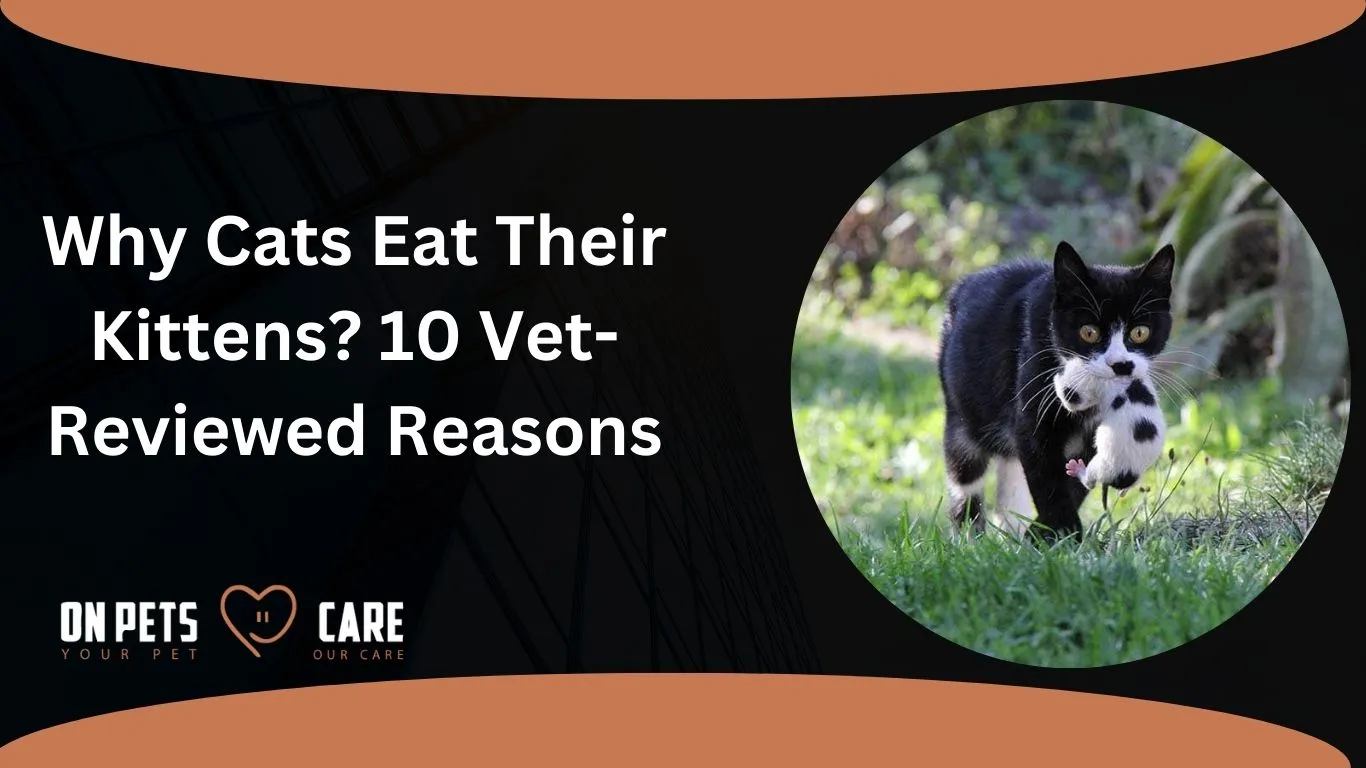Why Cats Eat Their Kittens? 10 Vet-Reviewed Reasons
Cats, those enigmatic and often cuddly creatures, have a reputation for their adorable kittens. But what happens when a mother cat unexpectedly devours her offspring? It’s a perplexing and sometimes shocking behavior that leaves many cat owners bewildered. In this article, we’re going to delve deep into the enigma of why cats eat their kittens.
We’ve consulted with Veterinary experts to uncover the top ten reasons why cats eat their kittens and how to know if a cat ate her kittens. So, if you’re eager to unlock the secrets of feline motherhood, read on! We are going to tell you very shocking reasons in light of Onpets Care reviews and suggestions as well.
Table of Contents
How to Know If a Cat Ate Her Kittens
To determine if a cat has consumed her kittens, watch for signs such as a sudden reduction in the litter size, a lack of maternal interest, increased aggression, or evidence of partially consumed kittens. If you notice any of these signs, consult a veterinarian promptly to ensure the well-being of the mother cat and any surviving kittens.
Understanding the Shocking Behavior of why cats eat their kittens
Before we dive into the reasons why cats eat their kittens, let’s understand what Maternal cannibalism in cats is.
What Is Maternal Cannibalism in Cats?
Maternal cannibalism refers to the act of a mother cat consuming one or more of her kittens.
The Intriguing Evolutionary Perspective
To grasp the motivations behind this behavior, let’s consider how evolution plays a part.
Rare, But Not Uncommon
Maternal cannibalism isn’t as rare as you might think. It’s crucial to recognize its occasional occurrence.
Top 10 Reasons Why Cats Eat Their Kittens
Now, let’s explore the ten vet-reviewed reasons behind this astonishing behavior.
Stress and Anxiety
Just like humans, cats can experience stress and anxiety, which can lead to unusual behavior.
Health Problems
Health problems in mother cats may drive them to consume their kittens. We’ll delve into specific conditions.
Insufficient Nurturing Instincts
In some cases, maternal instincts might be lacking, causing a mother cat to see her kittens as prey.
Birth Complications
Difficult childbirth can be traumatic for a cat, sometimes leading to maternal cannibalism.
Overcrowding
When a mother cat feels overwhelmed by too many kittens, she might resort to cannibalism.
Survival Instincts
Cats have strong survival instincts, which can make them prioritize their well-being over their kittens.
Environmental Factors
The cat’s surroundings can have a significant impact on her behavior.
Lack of Resources
A scarcity of food or other resources can lead a mother cat to consume her kittens.
Misdirected Hunting Instincts
Sometimes, a mother cat’s hunting instincts can misfire, leading to this unfortunate behavior.
Hormonal Changes
Hormonal imbalances can also influence a cat’s maternal behavior.
How to Know If a Cat Ate Her Kittens – Signs and What to Do
If you suspect your cat might have engaged in maternal cannibalism, it’s crucial to know how to identify it and take appropriate action.
Recognizing the Signs
Learn to recognize the signs of maternal cannibalism in cats.
Immediate Steps to Take
Discover what you should do if you suspect your cat has consumed her kittens.
Onpets Care – Supporting Your Cat and Her Kittens
Taking care of your cat and her kittens is essential. Here’s how to ensure their well-being.
Providing Adequate Nutrition
Offer your cat the right Nutrition during her pregnancy and nursing period.
Creating a Safe Environment
Ensure the environment is safe and comfortable for both the mother and her kittens.
Onpets Care is a dedicated resource for pet owners seeking to provide the best possible care for their feline companions. With a wealth of expert advice and insights, Onpets Care offers a helping hand in navigating the complexities of cat ownership. Whether you’re looking for guidance on Nutrition, behavioral concerns, or health-related issues, this platform is your trusted partner in ensuring the well-being and happiness of your beloved cats. Dive into a world of valuable information and practical tips, making your journey as a cat parent smoother and more enjoyable. At Onpets Care, your cat’s health and happiness are at the forefront of everything we do.
Conclusion
In conclusion, while the act of a mother cat eating her kittens can be deeply distressing, it’s essential to understand the various reasons why cats eat their kittens. By recognizing the signs and addressing potential issues, you can provide the support your cat needs during this crucial period. Remember that maternal cannibalism is a complex and multifaceted issue, and seeking advice from a veterinarian is always a wise choice.
Frequently Asked Questions (FAQs)
Can maternal cannibalism be prevented?
Preventing maternal cannibalism in cats involves ensuring a stress-free environment, proper nutrition, and timely Veterinary care.
Is it normal for a cat to eat one or more kittens occasionally?
While not common, it’s within the realm of feline behavior. Understanding the causes can help mitigate the risk.
Will a mother cat always eat her kittens if she feels stressed?
No, not always. Many factors contribute to this behavior, and not all stressed cats resort to maternal cannibalism.
Can a veterinarian help if a cat has consumed her kittens?
Yes, a veterinarian can provide guidance and assess the health of the mother cat if she has eaten her kittens.
How long should a cat be separated from her kittens after maternal cannibalism?
The separation duration varies but typically lasts until the mother’s behavior stabilizes and she poses no threat to the remaining kittens.



